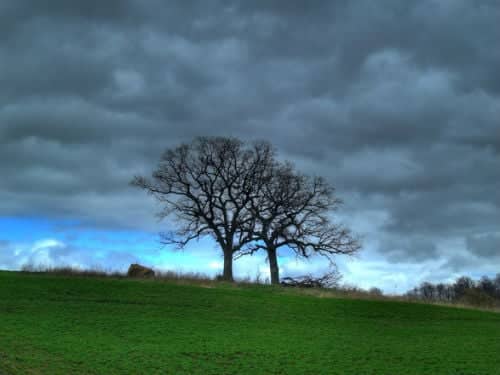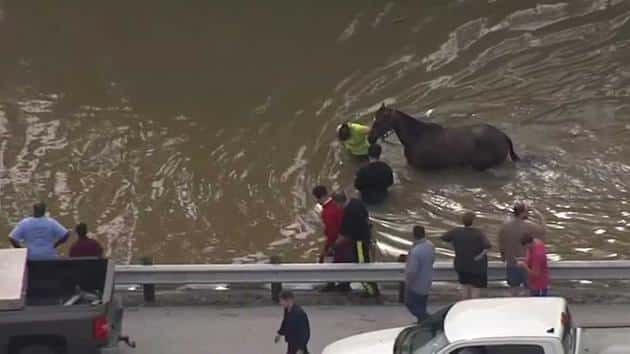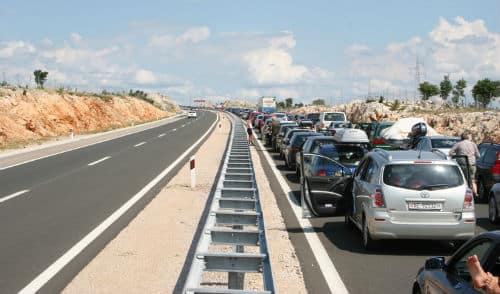10 Tips to Help Prepare Your Farm For Bad Weather
Hurricanes, floods, draughts, tornadoes, and electrical outages. These are just a few of the curve balls that Mother Nature can throw your way. Here are 10 tips for how to weather the storm from a Houston horsewoman who recently saw dangerous flooding threaten dozens of horses in her local area.
Monique Francis is the founder of the Love Angus Foundation, which rescues horses, cats, and dogs in both Houston, Texas and on the island of Jamaica. We connected with her to discuss her experiences two weeks after raging floodwaters endangered the lives of over 100 horses in the Houston area.
This flooding event was really unexpected for the local residents. Much of the rising water occurred overnight, so when people woke up, their animals were already in danger. When large storms hit, it is very important for farm owners to be prepared for the worst. Monique and I discussed some best practice tips that she uses to be sure her animals are safe and well cared for in the case of floods, power outages, and even hurricanes.
It is important to stress that Monique and all of her animals were safe from the storm. She watched most of the flooding horror on TV.
Tip #1: Have your trailer ready to go in case you need to hit the road!
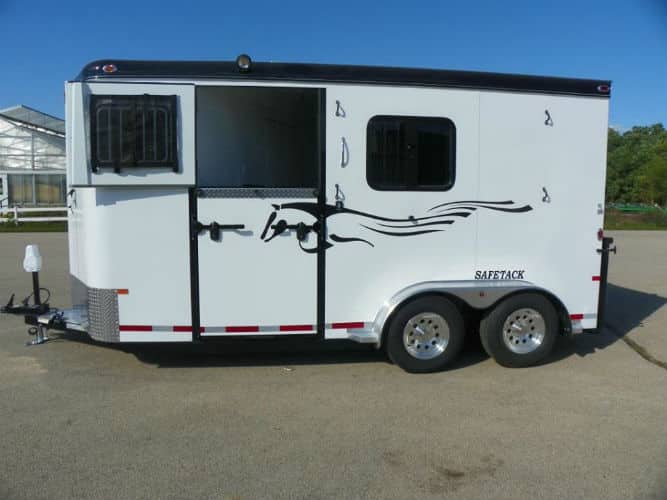
It is also important to have your trailer ready to go if it is needed for evacuation. Make sure the tires are inflated, your tow vehicle is ready, and your horses are familiar with loading. This image shows a 2 horse trailer from Double D Trailers. All trailers should always be kept in good maintenance in case they are needed. Read more on how horse trailers evacuation can save lives.
Tip #2: Know your local routes to safety.
Monique explained, “Some roads are still blocked off due to flooding and heavy rain two weeks later!” Know in advance which roads are prone to flooding and what your safest escape route will be if you need to move your animals in a hurry.
For Monique and other local horse owners, the relief help has been slow to come, so they often find themselves dealing with problems on their own. “In Jamaica, it’s a little bit worse because of the terrain. If we have massive rain in the mountains, it’s very hard to travel down the road, because it’s very dangerous and very slippery.” She also described one-way roads and flooded bridges. “You’re risking your lives sometimes when you’re trying to save or help these animals.”
Monique's animals were safe from the floods. She watched with the rest of us as the TV showed daring rescues of animals that were not so lucky. Photo credit: ABC13 News
Tip #3: Board up any windows or doors if high winds are expected.
With this most recent storm, only some areas experienced power outages, but that was not the case in September 2008 when Category 4 Hurricane Ike swept through the area. Monique recalled that time. “There wasn’t a lot of flooding, but we had a lot of wind damage, trees down, building damage. No one had power at that time. We had no electricity for one week and no running water for four days.”
Monique and her neighbors were well prepared for the storm. They purchased extra water, generators, and other supplies that were shared between households. They also boarded up portions of the home and barns to make sure the animals were safe from blowing debris.
Tip #4: Stock up on food and water for yourself and your animals. Store this in a protected area so it is not destroyed by the weather.
One of the most important steps Monique took for Hurricane Ike was stock piling her animals’ food and water supplies ahead of the storm. “If we know bad weather is coming, then we will try to stock up on supplies as much as possible.”
Make sure you have enough food, water, and medical supplies to last you for several days in case you become stranded. Store in a place where it can stay secure and dry. “You can save all the product you want, but if it’s ruined by floods, then you’re in an even worse situation.”
Tip #5: Make a judgment call when it comes to evacuating. If you get stuck in a traffic jam, make sure you have enough water to keep your horses hydrated.
When Hurricane Ike came through, people were told to evacuate, but Monique and the other staff decided to stay put.
“Honestly, we had a mandatory evacuation when Ike came, but to get out of Houston was really difficult.” Monique recalled the packed lanes of Interstate-10 that lead north to higher elevation. “You literally could not go anywhere. It was bumper-to-bumper traffic.
What normally would take four hours, took an entire day for normal people in their cars. “For us, that’s not realistic. We can’t keep animals locked in a trailer in 90 degree weather for that amount of time.” Fearing animal heat stroke and other complications, they decided to wait it out instead.
Tip #6: If you live in an area prone to bad weather, build your facilities to withstand the elements.
The Love Angus Foundation has several faithful volunteers that help with the care of the rescued animals. Luckily, one of the volunteers is skilled in construction. He has helped the foundation build their facilities with the local weather patterns in mind. Since evacuation is not always an option so it is important that the barns can withstand the storms.
“We are aware of weather in this area. We build with that in mind.” She explained how buildings made of wood or cheaper materials are usually badly affected by the storms. “We take things like that into account when we transport horses and look at where they are going to live.”
Tip #7: Have your first aid materials ready. Educate yourself on basic techniques in case a veterinarian is unable to provide immediate assistance.
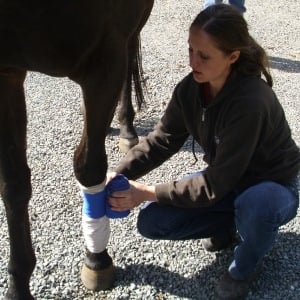
Tip #8: Educate yourself on rescue techniques and be cautious.
Luckily, Monique and her animals were not affected by the worst of this recent storm. She watched much of the drama on the TV. “It was horrible. If I went out into my backyard and saw that, I would jump in the water to save my horse. I wouldn’t even think about it.”
It wouldn’t be the first time she risked her life for an animal. “I’ve had instances where I had to jump into the water to rescue an animal,” she shared referring to a time she rescued a drowning dog. “Then, you realize that you could have been injured or the animal could have been hurt. Still, they are a part of you - a part of your life. They become a part of your family.” Monique was able to make this rescue because she is a very strong swimmer and knows proper rescue techniques.
Tip #9: Make sure all of your animals have visual identification.
Her heart goes out to anyone who has lost track of their animals in the recent storms. That is why she is always careful to have identification on all of the foundation’s rescued animals. “We make sure that everyone is tagged. Sometimes for the horses, we’ll tie a very thin rope with identification onto their mane or tail.” She explained that this is better than a halter label because halters can snag on tree limbs and place the horse in danger. “We always want them to be able to move freely.”
Tip #10: Have your emergency contact numbers and documents ready to go.
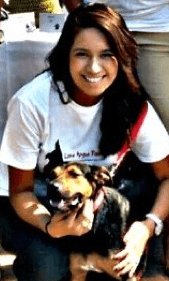
This includes having your emergency contact numbers and documents ready to go. This should include numbers for the local fire department, volunteers to help with animal care, vet, farrier, and large animal rescue services. Save important documents for your animals on electronic file incase the hard copy is ruined. “There are a lot of people here that were affected very badly from the rain and flooding. Be prepared at all times.”
Rescuing animals in two different countries is tough job even when the weather is calm and sunny. Still, Monique and the Love Angus Foundation are keeping their spirits up. “We are sticking through it and working through the hardships.”
If you would like to learn more about the Love Angus Foundation, check out their profile on the Double D Trailers Horse Rescue Corner. They are always accepting donations and are especially in need of a 7-horse stock bumper pull horse trailer.
Please Note: Thankfully, Monique and the animals of the Love Angus Foundation were NOT involved in the flood horse rescues shown on TV.

